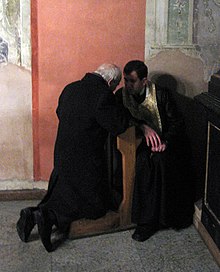
A mortal sin (Latin: peccātum mortāle), in Christian theology, is a gravely sinful act which can lead to damnation if a person does not repent of the sin before death. It is alternatively called deadly, grave, and serious; the concept of mortal sin is found in both Catholicism and Lutheranism.[1][2] A sin is considered to be "mortal" when its quality is such that it leads to a separation of that person from God's saving grace. Three conditions must together be met for a sin to be mortal: "Mortal sin is sin whose object is grave matter and which is also committed with full knowledge and deliberate consent."[3] The sin against the Holy Spirit and the sins that cry to Heaven for vengeance are considered especially serious.[4] This type of sin is distinguished from a venial sin in that the latter simply leads to a weakening of a person's relationship with God. Despite its gravity, a person can repent of having committed a mortal sin. Such repentance is the primary requisite for forgiveness and absolution.[5]
Teaching on absolution from sins is varied somewhat throughout Christian denominations. The teaching for Catholics on the sacrament of confession and the act of contrition for absolution was declared a mandatory catholic belief in the Council of Trent. Confession and Absolution is practiced in Lutheran churches, with it being historically held on Saturdays in preparation for Mass on the Lord's Day.[6][7]
- ^ "Dictionary : MORTAL SIN". www.catholicculture.org. Retrieved 2023-06-13.
- ^ Cite error: The named reference
Pieper1950was invoked but never defined (see the help page). - ^ "Catechism of the Catholic Church - PART 3 SECTION 1 CHAPTER 1 ARTICLE 8". www.scborromeo.org. Retrieved 2020-09-28.
- ^ Gaume, Jean (1883). The Catechism of Perseverance; Or, An Historical, Dogmatical, Moral, Liturgical, Apologetical, Philosophical, and Social Exposition of Religion. M.H. Gill & Son. p. 871.
Q. What other sins ought we to fear most? A. The other sins that we ought to fear most are sins against the Holy Spirit and sins that cry to Heaven for vengeance.
- ^ Hanna, Edward Joseph (1907). . In Herbermann, Charles (ed.). Catholic Encyclopedia. Vol. 1. New York: Robert Appleton Company.
- ^ Kolb, Robert (2008). Lutheran Ecclesiastical Culture: 1550 – 1675. Brill Publishers. p. 282. ISBN 9789004166417.
The North German church ordinances of the late 16th century all include a description of private confession and absolution, which normally took place at the conclusion of Saturday afternoon vespers, and was a requirement for all who desired to commune the following day.
- ^ "The Sacraments of the Lutheran Church". Christ The King Lutheran Church. Retrieved 14 May 2023.
The Sacrament of Holy Absolution has two forms: the General Confession (known as the Penitential Rite or Order of Confession of Sins) that is done at the beginning of the Divine Service. In this case, the entire congregation says the confession, as the pastor says the absolution. Private Confession – done privately to a pastor, where the penitent confesses sins that trouble him/her and pleads to God for mercy, and the pastor announces God's forgiveness to the person, as the sign of the cross is made. Private confession is subject to total confidentiality by the pastor. In historic Lutheran practice, Holy Absolution is expected before partaking of Holy Communion. General confession, as well as Private Confession, are still contained in most Lutheran hymnals. Two works which are part of the Book of Concord lend support to the belief that Holy Absolution is for Lutherans the third sacrament. The Apology of the Augsburg Confession acknowledges outright that Holy Absolution is a sacrament, referring to it as the sacrament of penitence. In the Large Catechism, Luther calls Holy Absolution the third sacrament.